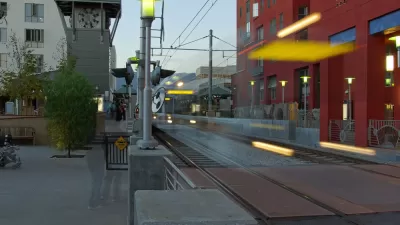Two USC professors argue that Los Angeles would be better served if Metro could recapture some of its investment in the county's expanding rail system.

In light of the extensions of the Los Angeles County Metropolitan Transportation Authority's (Metro) extension of the Gold and Expo lines this year, USC professors Marlon Boarnet and Gary Painter want to ensure that the benefits of Metro investments get back to L.A. communities.
In a Los Angeles Times op-ed, the authors note areas in the city where rail investment has helped to drive up the value of land and to fuel development. Metro has helped to generate that value, they argue, so Metro should be able to recoup some of it for the benefit of the city—especially areas neglected by other investment:
"Fairness suggests that the taxpayers who are footing the bill for the transit lines should share in the wealth that rail creates."
The authors look to Hong Kong and Brazil for successful value-capture programs, but ultimately endorse a local solution: Enhanced Infrastructure Financing Districts (EIFDs).
If Metro could establish EIFDs surrounding stations throughout the rail system, the agency could capture the tax increment from the increase in land value created by its projects.
The revenue could go toward building affordable housing (Metro's Joint Development Program currently has a target of 35 percent affordable units per project), parks, further transportation improvements, or any number of things.
As the authors point out, all this would make Metro "much more than a people-mover"—a direction the agency has already been moving in, with its stated attention to gentrification and policy of fostering transit-oriented communities.
EIFDs are still new, and few have taken shape in urban areas, although one has been proposed around the L.A. River.
FULL STORY: Op-Ed: How L.A. can improve its return on our multibillion-dollar transit investment

Alabama: Trump Terminates Settlements for Black Communities Harmed By Raw Sewage
Trump deemed the landmark civil rights agreement “illegal DEI and environmental justice policy.”

Planetizen Federal Action Tracker
A weekly monitor of how Trump’s orders and actions are impacting planners and planning in America.

Why Should We Subsidize Public Transportation?
Many public transit agencies face financial stress due to rising costs, declining fare revenue, and declining subsidies. Transit advocates must provide a strong business case for increasing public transit funding.

New California Law Regulates Warehouse Pollution
A new law tightens building and emissions regulations for large distribution warehouses to mitigate air pollution and traffic in surrounding communities.

Phoenix Announces Opening Date for Light Rail Extension
The South Central extension will connect South Phoenix to downtown and other major hubs starting on June 7.

How Housing as a Financial Product Harms Communities
Institutional buyers who treat housing as an investment product become disconnected from the impacts of higher rents, displacement, and housing instability.
Urban Design for Planners 1: Software Tools
This six-course series explores essential urban design concepts using open source software and equips planners with the tools they need to participate fully in the urban design process.
Planning for Universal Design
Learn the tools for implementing Universal Design in planning regulations.
Caltrans
Smith Gee Studio
Institute for Housing and Urban Development Studies (IHS)
City of Grandview
Harvard GSD Executive Education
Toledo-Lucas County Plan Commissions
Salt Lake City
NYU Wagner Graduate School of Public Service




























